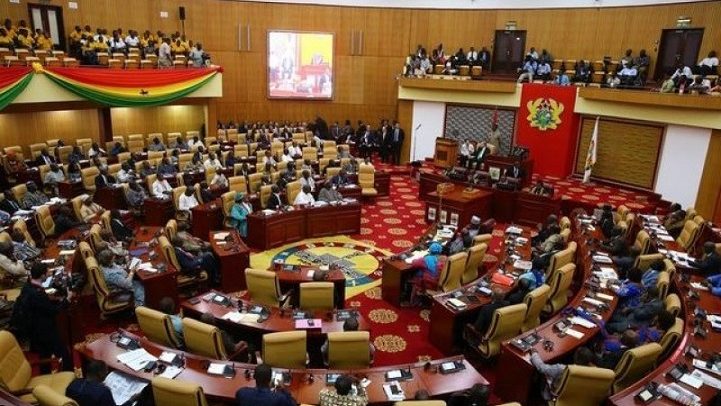Parliament approved changes to the Contract Act 1960 (Act 25) yesterday to provide for the type of interest to be paid on a sum of money due to a party of a contract or transaction entered into on behalf of the government.
The amendment to the legislation will protect the interest of the state with regard to interest payment and effectively reduce the cost of engaging in a contract or transaction by the state.
The House also amended the Whistleblower Act 2006 (Act 720) to expand the sources of money for the Whistleblower Reward Fund, with its main sources of funding being voluntary contributions and budgetary allocations by Parliament, to provide a ceiling for the fund and to specify the mode of rewards for whistleblowers.
Contracts (Amendment) Bill
The Contracts (Amendment) Bill 2022 was laid in Parliament on February 17, 2023 by Minister for Justice and Attorney General (AG), Godfred Yeboah Dame, pursuant to Article 106 (1) of the 1992 Constitution.
The bill was subsequently referred by the Speaker to the Committee on Constitutional, Legal and Parliamentary Affairs for consideration and report pursuant to Article 106 (4) of the 1992 Constitution and Order 179 of the Standing Orders of Parliament.
The government said Act 25 did not make explicit provision regarding persons authorised to enter into contract on behalf of the state, and that there were also no provisions on a common pathway for the calculation of interest due on government contracts.
The AG argued that the lack of restrictions on persons qualified to enter into contract has the tendency to allow any persons in authority to enter into contract without the knowledge or authorisation of the sector ministers who are vested with the overall responsibility and executive mandate over the administration of their sector.
The liberalisation regarding mode of calculation of interest due parties in government contracts also have the tendency for abuse of discretionary powers by persons who enter into contracts on behalf of the state, the minister noted.
The bill, therefore, makes explicit provisions for persons who are authorised to enter into a contract or transaction on behalf of the government.
It also provides for the payment of interest on any sum of money due under a contract or a transaction entered into on behalf of the government to be calculated at simple interest.
Observations
The lawmakers observed that there was a seemingly imposition of restriction on Freedom of Contract.
In explaining the reasons for the proposed amendment, the Deputy Attorney General, Diana Asonaba Dapaah indicated that a need had arisen to have consistency in all state contracts with respect to payment of any interest due parties in the contract or transaction.
The policy rationale is to regulate the discretionary powers of ministers and other persons authorised by law to enter into contract on behalf of the state by limiting them to a standardised mode with respect to payment of interest.
She further explained that the amendment was only seeking to create a similar condition as provided under Article 181 of the 1992 Constitution, regarding prior approval of Parliament for all international transactions entered into by the government on behalf of the state.
According to her, the proposed amendment will serve as a prior knowledge and a guide to all state authorities, as well as other contracting parties under government contracts regarding decisions on payment of any possible interest by the state.
Whistleblower
On the other hand, the Whistleblower (Amendment) Bill 2023 was laid in Parliament on March 7, 2023 and was subsequently referred to the Committee on Constitutional, Legal and Parliamentary Affairs for consideration and report pursuant to Article 106 (4) of the 1992 Constitution and Order 179 of the Standing Orders of Parliament.
The Whistleblower Act, 2006 (Act 720) was passed in 2006 as part of efforts at creating incentives and the proper structures to strengthen Ghana’s ability to combat corruption and other forms of unlawful conduct that negatively affect sustainable development efforts.
The government said Section 20 of Act 720 established the Whistleblower Reward Fund with its main sources of funding being voluntary contributions and budgetary allocations by Parliament.
The possibility of delay in releases of approved budget into the fund may affect prompt payment of rewards to whistleblowers.
It pointed out in addition that Act 720 is silent on the time period within which the Whistleblower should be rewarded for the efforts leading to successful recovery of moneys or proceeds obtained from the sale of confiscated assets.
The amendments are meant to cure the shortcomings in Act 720 by reducing overreliance on budgetary allocations as the main sources of revenue into the Whistleblower Reward Fund, and to also provide for timelines for payment of the rewards to successful whistleblowers.
Highlights
Clause 1 of the bill introduces a new clause to provide for the utilisation of monies recovered or proceeds obtained from the sale of a confiscated asset as a result of the disclosure by a whistleblower.
Twenty per cent of the monies recovered or proceeds obtained from the sale of a confiscated asset is to be paid into the fund whilst the remaining 8 per cent is to be paid into the Consolidated Fund.
Clause 2 amends section 21 of the Act to expand the sources of money of the fund to include twenty per cent of any amount of money recovered as a result of the disclosure by a whistleblower.
Clause 3 amends section 24 of the Act to specify the mode of rewarding a whistleblower. Where a whistleblower makes a disclosure and the disclosure results in the recovery of an amount of money that is paid into the fund, the whistleblower is entitled to, within fourteen days after the payment of the money into the fund, a reward of ten per cent of the money that is recovered and paid into the fund.
By Ernest Kofi Adu, Parliament House


